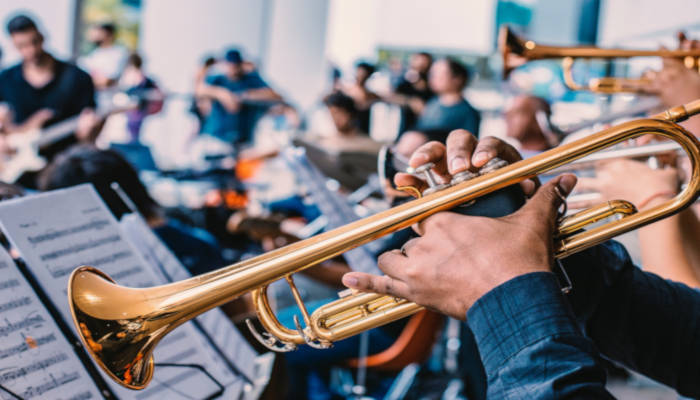
Trumpets offer one of the boldest and most unique sounds in an orchestra. Mastering three valves may seem more approachable than a multi-keyed surface, such as a clarinet. But playing trumpet can still be challenging.
I’ve played the trumpet for more than a decade. And there are still things I’m learning. With experience in orchestras, marching bands and jazz bands I’ve encountered all the most common questions that beginning trumpet players typically ask.
Here we’ll cover the most fundamental questions about the history, sound and methods needed to play the trumpet. We’ll also explore some inspirational players and styles of music that you may find enjoyable.
Background and history of the trumpet
Who invented the trumpet?
The trumpet has existed in many forms throughout human history. Origins of the trumpet trace far back to early civilization.
The trumpet originated as an animal horn for sending sound across vast distances. Early hunters and villagers would use these horns to send warnings and other signals to others that were too far away to hear their voice.
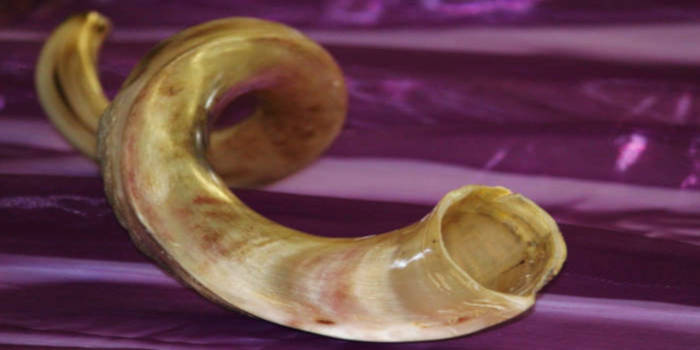
The evolution from horn to trumpet took place over many centuries. In the middle ages, the horn became a proper instrument instead of a part of wars, ceremonies and signals.
Options to explore the horns’ tonal potential began as the bourgeoisie increasingly appreciated musical exploration. The first changes to the instrument were the additions of “crooks” (extra tubing) to achieve alternate octaves.
These crooks turned horns into a basic version of the trumpets we know today. Although players had to stop playing music to make these octave changes, it was nonetheless a revolutionary development.
Anton Weidinger (1766-1852), a Viennese trumpeter, changed the trumpet further during the late 18th century. He invented the keyed trumpet which allowed for quick changes in music.
In 1818 Heinrich David Stölzel (1777-1844) and his partner Friedrich Blühmel (1777-1845?) finally invented the first modern brass valve. This created the trumpet known as a boxed tubular valve trumpet—essentially, the modern-day trumpet.
What family does the trumpet belong to?
The trumpet, along with the French horn, trombones, baritones and tubas, belong to the brass family of instruments. Brass instruments create loud, crisp sounds that can fill large spaces and are, as the name implies, usually made of brass.
The instrument’s unique disposition makes it suited to play in a variety of settings. The trumpet functions well with other members of the brass section, the full orchestra or alone.
How does a trumpet work?
Trumpets produce sound by bending air. Valves help us tame this sound into desirables tones and octaves. Trumpeters can use their embouchures, the valves and even mute to change the sound of the trumpet as required by the music.
Embouchure (pronounced like ahm-boo-sure) is the use of facial muscles, lips, tongue and teeth to create a sound on a wind instrument. This muscle group requires practice to create a smooth sound and to vary the pitches a trumpet can produce.
Changing the way trumpeters position their lips can affect the sound they make. Tightening or loosening your embouchure will create different tones in your instrument. Adjusting slide positions can help you stay in tune.
Getting the proper sound out of a trumpet isn’t easy for most new trumpeters. Training your muscles to create a consistent sound can take months. Practice is vital in developing these muscles. Confidence is another key factor of success in playing the trumpet, so play it like you believe it!
What is the trumpet made from?
Trumpets and horns used to be made of wood, tusks and animal horns. Today’s trumpets are typically made from brass. But they can be made with other metals as well. Silver and gold are the most popular alternate metals for horns.
Different variations of the horn, such as the vuvuzela and digeridoo, are still made from wood or plastic. These horns have cultural ties to indigenous populations and often still use traditional methods in their manufacturing.
What is the range of a trumpet?
Like most instruments, trumpets are produced in a range of different sounds for various reasons. Typical ranges of trumpets are from F# (f-sharp) below middle C up to three octaves higher.
What key is the trumpet in?
There are several different types of trumpets produced in different keys, such as A, B♭, C, D, E♭, E, low F and G. B♭ and C trumpets are the most commonly played trumpets today. These are regarded as the best ranges for producing mainstream sounds in orchestras.
Is trumpet easy to play?
Trumpets are an excellent instrument for beginners. The basics of horn sounds are easy to produce. Airstream and lip vibrations in combination with valve positions can be learned by school-age children.
But like any instrument, trumpets can be challenging to play well. That’s one reason why there are only a handful of famous trumpeters, despite the instrument’s long history.
What genres of music are most popular for trumpet?
Trumpets are popular in many different forms of music. Jazz and classical music are the most mainstream genres that feature the trumpet. But trumpets can appear elsewhere as well.
Marching band, big brass, and religious music often feature trumpets and other substantial brass sections.
Who are some famous trumpet players?
Although the trumpet is one of the oldest instruments in human history, there are only a handful of well-known trumpeters. Jazz legends like Louis Armstrong (1901-1971) and Miles Davis (1926-1991) made themselves known by skillfully improvising music and creating dynamic sounds.
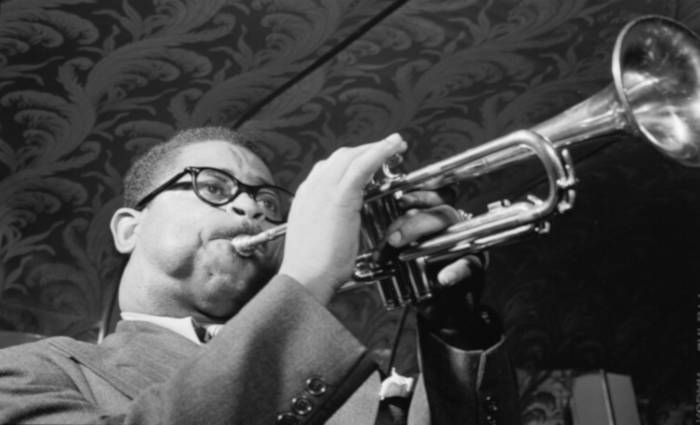
Armstrong’s nickname, Satchmo, is derived from “Satchel Mouth” because of his dynamite sound. Other notable names include Dizzy Gillespie (1917-1993), who was known for his musical range, and Chet Baker (1929-1988), who was also known for his vocals.
Buying a trumpet
How much does a trumpet cost?
Costs for new trumpets can vary widely by producer and quality. The instruments can also be purchased secondhand in pawn shops for around $100, while new Yamahas or Bachs start around $300. A popular student model like the Jean Paul USA TR-330 will cost around $250 new.
Professional performer trumpets start around $2,500 and can quickly increase in price from there. The most expensive trumpet ever was a Yamaha Platinum Trumpet which sold for $125,000.
Which trumpet is best for beginners?
Several popular producers make student, or beginner, trumpets. Some of the most popular models are:
- Yamaha YTR-2330, YTR-4335 GII and YTR-300ADS
- Bach TR300H2 American Student Trumpet
- Jean Paul USA TR-330
- Jupiter 600L
The Jupiter 600L trumpet is significantly more expensive than the rest of the list (around $1,000) but produces quality sounds for beginners.
While there are many trumpets suitable for beginners, Yamaha and Bach are two of the most popular brands. They offer trumpets that are both forgiving and sturdy, which can be exactly what a new player needs.
Owning and playing a trumpet
How often should you clean your trumpet?
Cleaning your trumpet is an essential part of how your trumpet sounds. Regularly empty your trumpet’s spit valves. Clean the horn between once a month and once a week, depending on how often you play your trumpet.
Valves are an integral part of a trumpet’s sound and require special attention when cleaning. The valves and lead tube may need cleaning more frequently than the rest of the horn.
How to hold a trumpet?
Trumpets are held the same for right- and left-handed players:
- Rest your right hand with your forefinger, middle and ring finders over the top of the valves and your pinky finger in the top-most finger ring.
- Rest your left hand around the bottom of the valve case without having your palm on the case itself.
- Insert your left ring finger ring through the front finger ring with your left thumb resting neatly in the u-shape finger ring in the back of the trumpet.
- Rest your pinky against the bottom of the third valve’s casing.
See How to Hold a Trumpet for more details.
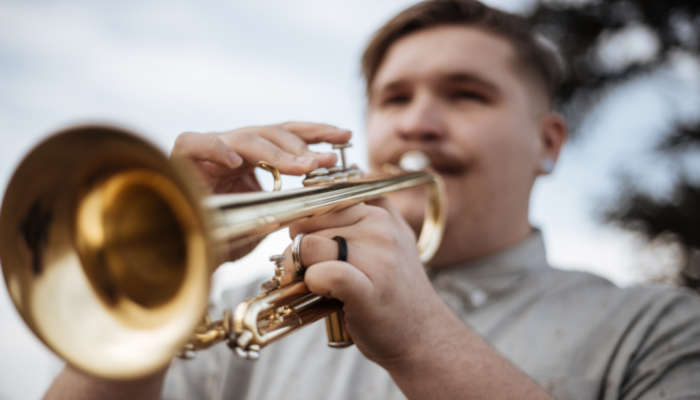
How to fix your trumpet embouchure?
Embouchure improvement can be a daunting task. And figuring out the most natural way to produce the right sound can be a journey of discovery.
Here are some tips to improve your sound:
- Experiment with the placement of your lips on the mouthpiece, this can allow you to make different sounds and pitches.
- Change the pressure of the air you blow.
- Pay attention to your breathing. Training yourself to breathe properly when playing music will take time.
- Sit up straight. Posture is important for air flow from the chest up.
- Don’t puff your cheeks out. It can be tempting at first. But soon it will feel natural to channel that pressure into your horn.
How long does it take to learn trumpet?
Learning to play the trumpet can require a varying amount of time for different people. The general rule of 10,000 hours to master a skill may hold true here. But in general, a few years will do to master the basic trumpet skills.
Most people who play consistently will master the horn in 4-5 years. There are prodigies and those who practice often who can expect to do this in less time.
Can a trumpet go out of tune?
Yes, trumpets can go out of tune for many reasons. Extreme cold or hot temperatures will change the tuning of a trumpet, as well as moisture and time between playing.
Interestingly, the valves are responsible for the trumpets inability to stay in tune. However, repositioning the slides can adjust for proper tuning.
Are there any helpful books available for beginner trumpet players?
There are a variety of books for trumpet players who are just beginning their journey. Method books can be useful. But biographies about famous trumpeters, such as Coltrane and Armstrong can also be useful.
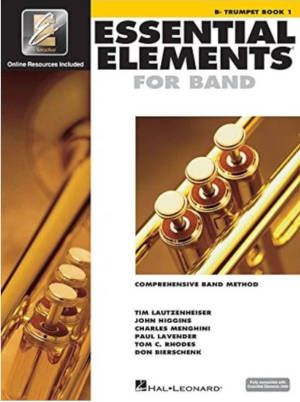
Some great books for trumpeters are:
- Pops: A Life of Louis Armstrong
- Coltrane on Coltrane
- Arban Complete Conservatory Method for Trumpet
- Essential Elements 2000: Comprehensive Band Method: B Flat Trumpet Book 1
The last example, Essential Elements, is perhaps the most popular method book for beginners.
The trumpet is an instrument with a proud history and particularly brazen sound. It can be overwhelming to start at learning the instrument but the experience is rewarding. Trumpeters have a unique place in the orchestra and are often thought of as the strongest sounding instrument.
As you grow in experience and sound, your own style will become clear. Play a variety of different music to learn which style you really enjoy. Once you find a style you love, you won’t be able to put the trumpet down.
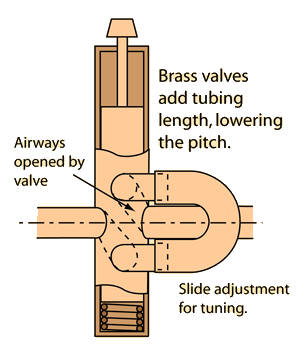
Leave a Reply